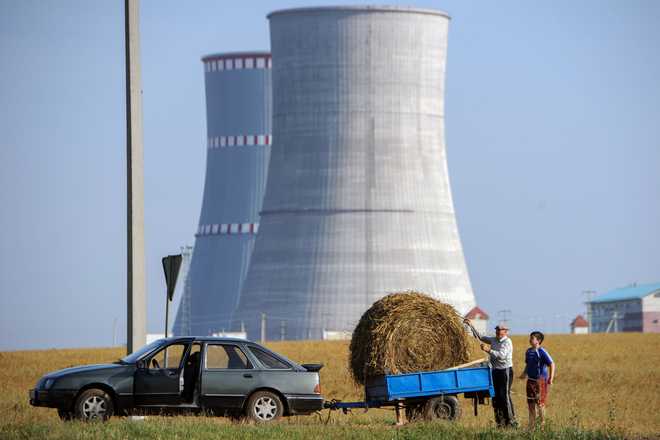
A picture taken on August 19 shows people transporting a bundle of straw close to the construction site of the first Belarus nuclear power plant outside the town of Ostrovets, some 170 km northwest of Minsk.
Ostrovets (Belarus), November 26
Thirty years after the Chernobyl disaster spewed radioactive clouds into the sky and sent shockwaves across Europe, Belarus is building a nuclear reactor on the doorstep of the EU despite fears in neighbouring Lithuania.
Construction of the facility, located in the northwestern Belarusian town of Ostrovets only around 20 kilometres from the Lithuanian border, is entering its final stages.
Its two reactors, each with a capacity of 1,200 megawatts, will be operational from 2019 and 2020 respectively.
The project, approved by strongman Alexander Lukashenko’s government in 2008 and spearheaded by the Russian state energy corporation Rosatom, is being nearly completely financed by Moscow with a USD 10-billion loan.
The construction of the reactor initially revived bad memories in a country that had a quarter of its territory covered with radiation from the 1986 explosion at the Soviet- era plant in Chernobyl, in present-day Ukraine.
“When we heard that a plant was being built literally outside our windows, we were scared,” said Nina Rybik, a writer who was one of tens of thousands evacuated from contaminated zones 30 years ago.
“But then the fear passed: we were told that advanced technology is being employed to build the station and that every single thing is being controlled,” she told AFP.
She said that even those who had gathered signatures against the construction of the plant were now trying to find work there.
As worries about nuclear safety had been magnified by the 2011 Fukushima disaster in Japan, the local authorities and the Russian contractor actively worked to reassure the nearby population.
To showcase their commitment to safety, Belarusian authorities demanded in 2016 that Rosatom replace equipment damaged during a fall, even though the Russian corporation insisted that the 330-tonne shell had merely touched the ground after sliding down from a four-meter height.
Rosatom calls the reactors “the most modern in the world” and says that they “respect all international norms”.
Belarusian sociologist Elena Martishchenkova said that around half of Belarusians support the development of nuclear energy, with the figure reaching 65 percent in the Ostrovets district this year.
But there is little optimism for nuclear energy on the other side of the border.
Vilnius denounced the project as a violation of “international nuclear and environmental safety requirements”, as it is located 20 kilometres from the EU border and only 40 kilometres from the Lithuanian capital.
Rosatom has repeatedly denied that the project violates international norms.
But Russia’s long silence about a leak of a radioactive isotope in September, first made public by French authorities, has revived memories about the Soviet Union’s initial denial then downplaying the danger the Chernobyl accident posed.
Rosatom denied last week the ruthenium-106 came from its facilities after Russia’s meteorological service confirmed “extremely high” concentrations of the isotope about 30 kilometres from a site where the firm reprocesses spent nuclear fuel.
In an interview with AFP, Lithuania’s foreign ministry spokeswoman, Rasa Jakilaitiene, accused Minsk of trying to conceal information and minimising the consequences of “at least six incidents” that occurred at the Ostrovets plant in 2016.
In May, the Lithuanian government even flew EU energy chief Maros Sefcofic in a hot air balloon over Vilnius so he could see how close the Belarusian plant was to the city, in an attempt to convince EU officials that the plant represented a health hazard. — AFP.


























